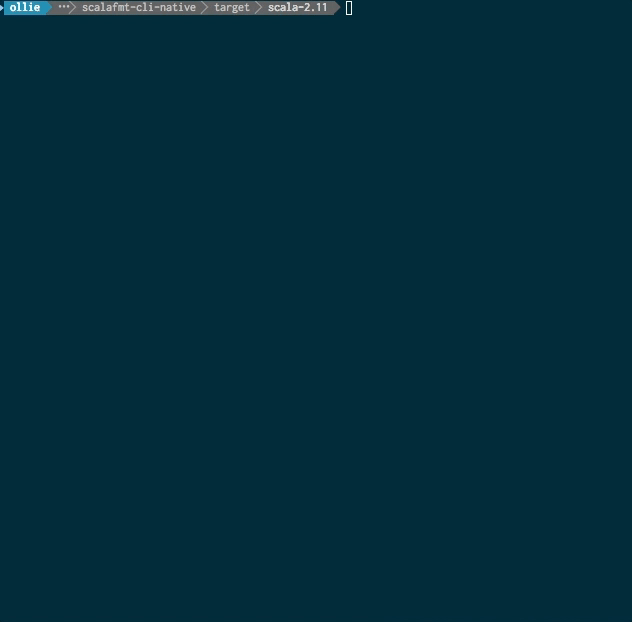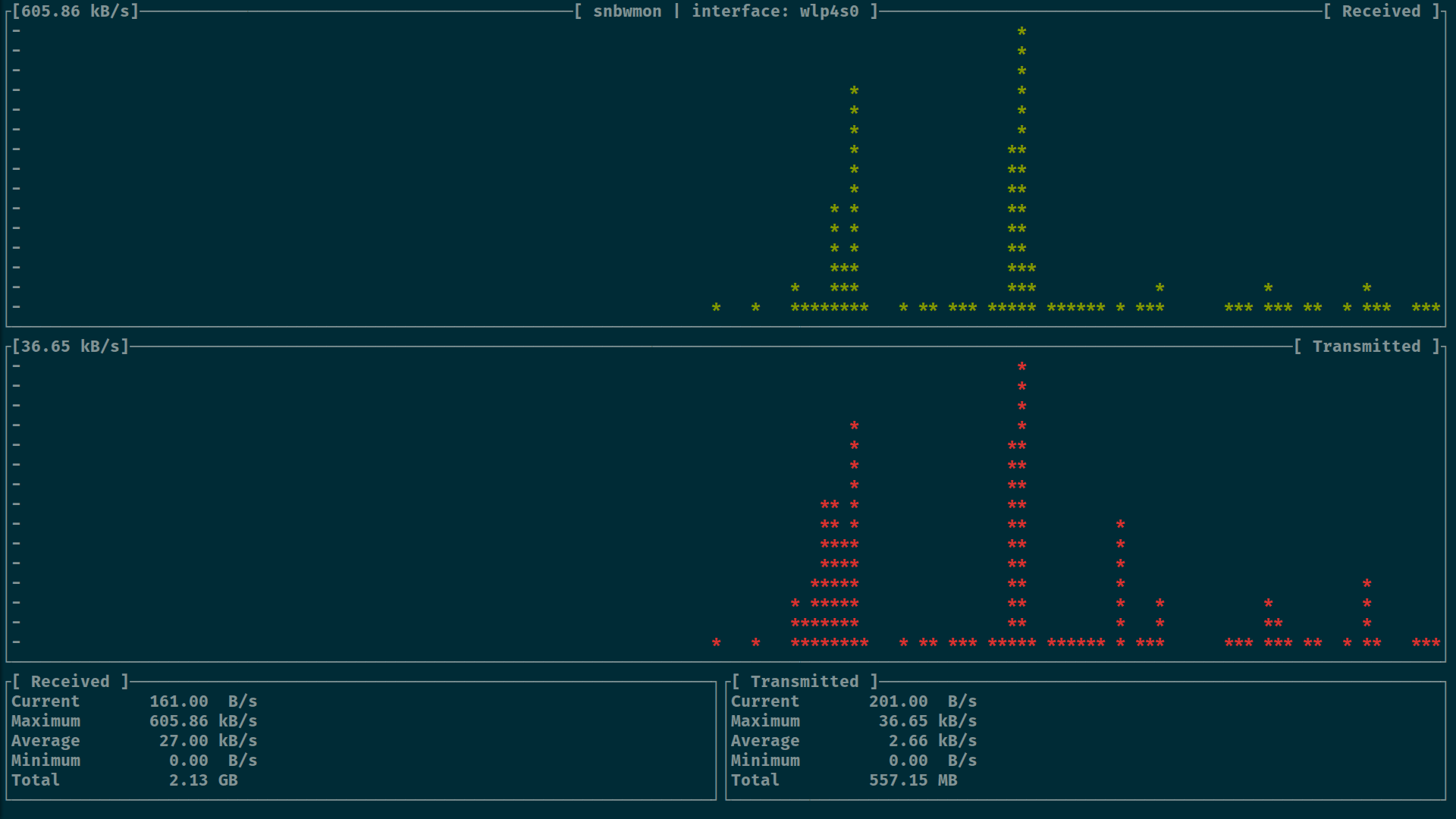Implementation Plan
- Draw Loop
- Find Network Interface Name
- Get Bitrate
- Draw Bitrate Graph
Draw Loop
object LoopMain {
def main(args: Array[String]): Unit = {
waitLoop {
println("tick")
}
}
}
Draw Loop (C VS Scala)
// In C
void waitLoop() {
long timer = 0;
bool redraw = true;
struct timeval tv;
while(true){
gettimeofday(&tv, NULL);
if (timer < tv.tv_sec) {
timer = tv.tv_sec;
redraw = true;
}
if(redraw) {
draw()
redraw = false
}
}
}
// IN Scala
def waitLoop(body: => Unit): Unit = {
var timer = 0L
var redraw = false
val tv: Ptr[timeval] =
stackalloc[timeval]
while (true) {
gettimeofday(tv, null)
if (timer < tv.tv_sec) {
timer = tv.tv_sec
redraw = true
}
if (redraw) {
body
redraw = false
}
}
}
POSIX api
//in C
int gettimeofday(
struct timeval *tv,
struct timezone *tz
);
struct timeval {
time_t tv_sec;
suseconds_t tv_usec;
};
@extern
object posix {
def gettimeofday(
tv: Ptr[timeval],
tz: Ptr[timezone]
): Unit = extern
type timeval = CStruct2[
time_t,
suseconds_t
]
}
POSIX api (cont.)
object posixops {
implicit class timevalOps(val ptr: Ptr[timeval]) {
def tv_sec: time_t = !(ptr._1)
def tv_usec: suseconds_t = !(ptr._2)
}
}
Implementation Plan
- Draw Loop
- Find Network Interface Name
- Get Bitrate
- Draw Bitrate Graph
ifaddrs api
int getifaddrs(
struct ifaddrs **ifap);
void freeifaddrs(
struct ifaddrs *ifa);
struct ifaddrs {
struct ifaddrs *ifa_next;
char *ifa_name;
unsigned int ifa_flags;
struct sockaddr *ifa_addr;
struct sockaddr *ifa_netmask;
struct sockaddr *ifa_ifu;
void *ifa_data;
};
@extern
object Ifaddr {
def getifaddrs(
ifap: Ptr[Ptr[Ifaddrs]]
): CInt = extern
def freeifaddrs(
ifa: Ptr[Ifaddrs]
): Unit = extern
type Ifaddrs = CStruct7[
Ptr[CByte], // scala-native#634
Ptr[CChar],
CInt,
Ptr[SockAddr],
Ptr[SockAddr],
Ptr[SockAddr],
Ptr[CByte]
]
}
C Flags
class SiocgifFlags(val value: CInt) extends AnyVal {
def &(other: SiocgifFlags): Boolean =
(value & other.value) == other.value
}
object SiocgifFlags {
val Up = new SiocgifFlags(1 << 1)
val Loopback = new SiocgifFlags(1 << 4)
val Running = new SiocgifFlags(1 << 6)
// ...
}
$$$ Richer Types $$$
implicit class IfaddrsOps(val ptr: Ptr[Ifaddrs]){
// scala-native#634
def next: Ptr[Ifaddrs] = (!(ptr._1)).cast[Ptr[Ifaddrs]]
def name: Ptr[CChar] = !(ptr._2)
def flags: SiocgifFlags = new SiocgifFlags(!(ptr._3))
def addr: Option[SockAddr] = Option(new SockAddrOps(!(ptr._4)))
def data: Ptr[Byte] = !(ptr._7)
// scala-native#367 we need to manually box Ptr[T]
def iterator: Iterator[IfaddrsOps] = new Iterator[IfaddrsOps]{
private var current = new IfaddrsOps(ptr)
def hasNext: Boolean = current.ptr.next != null
def next(): IfaddrsOps = {
current = new IfaddrsOps(current.next)
current
}
}
}
Get Network Interfaces
def withIfaddrs[A](f: Iterator[IfaddrsOps] => A): A = {
val ifaddrs = stackalloc[Ptr[Ifaddrs]]
if (getifaddrs(ifaddrs) != -1) {
val ret = f((!ifaddrs).iterator)
freeifaddrs(!ifaddrs)
ret
} else {
println("failed to getifaddrs")
sys.exit(1)
}
}
Find Network Interface Name
def findInterface: Option[String] = {
withIfaddrs(_.find(interface =>
(interface.flags & Up) &&
(interface.flags & Running) &&
!(interface.flags & Loopback)
).map(interface => fromCString(interface.name)))
}
Implementation Plan
- Draw Loop
- Find Network Interface Name
- Get Bitrate
- Draw Bitrate Graph
Total Received/Transmitted
case class Counters(val rx: CUnsignedLong, val tx: CUnsignedLong)
object Counters {
def apply(stats: Ptr[RtnlLinkStats]): Counters =
Counters(stats.rxBytes, stats.txBytes)
}
def getCounter(interfaceName: String): Option[Counters] = {
withIfaddrs(
_.find(interface =>
fromCString(interface.name) == interfaceName &&
ifa.addr.map(_.family == Packet).getOrElse(false)
)
.map(interface =>
Counters(ifa.data.cast[Ptr[RtnlLinkStats]])
)
)
}
Total Received/Transmitted (in C)
int getData(char* ifname, unsigned long *tx_bytes,
unsigned long *rx_bytes) {
struct ifaddrs *ifaddr, *ifa;
int ret = 0;
if (getifaddrs(&ifaddr) == -1) return;
for (ifa = ifaddr; ifa != NULL; ifa = ifa->ifa_next) {
if (ifa->ifa_addr == NULL)
continue;
if (!strncmp(ifname, ifa->ifa_name, IFNAMSIZ))
continue;
if (ifa->ifa_addr->sa_family == AF_PACKET &&
ifa->ifa_data != NULL) {
struct rtnl_link_stats *stats = ifa->ifa_data;
*tx_bytes = stats->tx_bytes;
*rx_bytes = stats->rx_bytes;
ret = 1;
break;
}
}
freeifaddrs(ifaddr);
return ret;
}
Catch 22
type RtnlLinkStats = CStruct22[
CUnsignedInt, // [1] rx_packets
CUnsignedInt, // [2] tx_packets
CUnsignedInt, // [3] rx_bytes
CUnsignedInt, // [4] tx_bytes
CUnsignedInt, // [5] rx_errors
CUnsignedInt, // [6] tx_errors
CUnsignedInt, // [7] rx_dropped
CUnsignedInt, // [8] tx_dropped
CUnsignedInt, // [9] multicast
CUnsignedInt, // [10] collisions
CUnsignedInt, // [11] rx_length_errors
CUnsignedInt, // [12] rx_over_errors
CUnsignedInt, // [13] rx_crc_errors
CUnsignedInt, // [14] rx_frame_errors
CUnsignedInt, // [15] rx_fifo_errors
CUnsignedInt, // [16] rx_missed_errors
CUnsignedInt, // [17] tx_aborted_errors
CUnsignedInt, // [18] tx_carrier_errors
CUnsignedInt, // [19] tx_fifo_errors
CUnsignedInt, // [20] tx_heartbeat_errors
CUnsignedInt, // [21] tx_window_errors
CUnsignedInt // [22] rx_compressed
// we are limited to 22 fields scala-native#637
// it's ok to ignore those since we don't allocate RtnlLinkStats64
// CUnsignedInt, // [23] tx_compressed
// CUnsignedInt // [24] rx_nohandler
]
< 22 we are safe
ifa.data.cast[Ptr[RtnlLinkStats]]
implicit class RtnlLinkStatsOps(val ptr: Ptr[RtnlLinkStats]){
def rxBytes: CUnsignedInt = !(ptr._3)
def txBytes: CUnsignedInt = !(ptr._4)
}
Implementation Plan
- Redraw Loop
- Find Network Interface Name
- Get Bitrate
- Draw Bitrate Graph
val size = windowSize(stdscr)
waitLoop {
getCounter(interfaceName).foreach(data =>
history += data
)
graphWindow(rxGraph, history, RX, Some(interfaceName), green)
graphWindow(txGraph, history, TX, None, red)
statsWindow(rxStats, history, RX)
statsWindow(txStats, history, TX)
doupdate()
}
@link("ncurses")
@extern
object ncurses {
import ncursesh._
@name("newwin")
def newWindow(
height: Int, width: Int,
y: Int, x: Int): Ptr[Window] = extern
// print formatted string
@name("mvwprintw")
def printFormatted(
window: Ptr[Window],
y: CInt, x: CInt,
fmt: CString, args: CVararg*
): CInt = extern
// print one char
@name("mvwaddch")
def printChar(
window: Ptr[Window],
y: CInt, x: CInt,
ch: ChType
): CInt = extern
}
Plain Scala
class CountersHistory (
maxSize: Int,
var lastTotal: Option[Counters],
txQueue: Queue[CUnsignedLong],
rxQueue: Queue[CUnsignedLong]){
def maximum(way: Way): Option[Double] =
stats(way, _.max.toDouble)
def average(way: Way): Option[Double] =
stats(way, q => q.sum.toDouble / q.size.toDouble)
def +=(v: Counters): CountersHistory = {
lastTotal.foreach{ lv =>
if(txQueue.size > maxSize) {
txQueue.dequeue()
}
if(rxQueue.size > maxSize) {
rxQueue.dequeue()
}
val t = v - lv
rxQueue += t.rx
txQueue += t.tx
}
lastTotal = Some(v)
this
}
private def stats(way: Way, statsF: Queue[CUnsignedLong] => Double): Option[Double] = {
val queue = getQueue(way)
if(queue.isEmpty) None
else Some(statsF(queue))
}
}
Plain Scala
def printGraphWindow(window: Ptr[Window],
history: CountersHistory,
way: Way
interfaceName: Option[String]): Unit = {
// Print the title
interfaceName.foreach{ name =>
val text = s"[ snbwmon | interface: $name ]"
val center = (size.width - text.size) / 2
printFormatted(window, 0, center, toCString(text));
}
// For each column...
history.maximum(way).foreach{ max =>
val (rate, unit) = showBytes(max)
printFormatted(window, 0, 1, c"[%.2f %s/s]", rate, toCString(unit))
// ... starting from the right ...
history.getQueue(way).reverse.zipWithIndex.foreach{ case (value, i) =>
val col = size.width - i - 2
val border = 2
val h = Math.ceil(value.toDouble / max.toDouble * (size.height - border).toDouble)
var j = size.height - 2
var jj = 0
// ... print each row
while(j > 0 && jj < h) {
printChar(window, j, col, '*')
j -= 1
jj += 1
}
}
}
}



